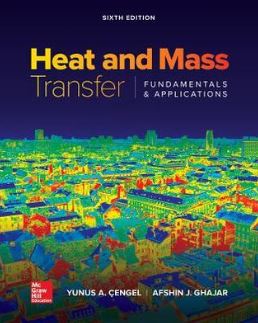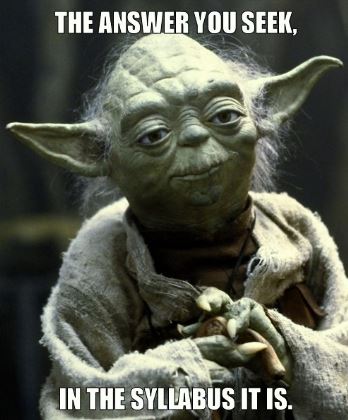Syllabus
Catalog description
(Prerequisities - MA213 and ES202 or CH301 or consent of instructor) Introduces the basic modes of heat transfer, heat transfer properties, steady and unsteady one-dimensional heat conduction, free and forced convection, radiation and heat exchangers.
Instructor
 |
Course level objectives
After successful completion of this course students will be able to
- calculate heat transfer, heat transfer rate, and/or temperature distributions for systems experiencing one or more modes of heat transfer including
- conduction,
- convection, and/or
- radiation;
- perform heat exhanger design problams; and
- perform heat exchanger analysis problems.
Text
 |
Çengel, Heat and Mass Transfer, Fundamentals & Applications (6th), McGraw-Hill (2020) Electronic access to this text via Vitalsource is available on Moodle. Click on the link in the Moodle page to gain access. Also see the Inlclusive Access FAQ page for specific instructions on downloading and using the text. In addition to the required text, you should also expect to refer to your undergraduate texts on fluid mechanics and thermodynamics. ES201 notes may also be helpful. |
Course activities & philosophy
Mastering any new subject requires continuous effort by the learner to make sense of new ideas and concepts and to relate them to what you already know. Learning to identify, formulate, and solve problems requires diligent practice in applying a logical problem-solving methodology. Learning to solve real life engineering problems also requires a willingness to deal with ambiguity and uncertainty.
This course is organized around development activities and evaluation activities. Development activities will take place all quarter long and provide you an opportunity to actively master the course material. These include homework and active learning exercises. Evaluation activities will consist of eight mini exams during the quarter and a final exam given during final exam week.
⇧Course expectations
Reading
Reading assignments will be made daily and should be completed before coming to class. (Daily reading assignments can be found in the Schedule section.) You are strongly encouraged to take notes as you read, especially by marking up your textbook. This makes reading a more active exercise and thereby increases its effectiveness greatly. Furthermore, you are encouraged to review your other undergraduate texts to gain a more thorough understanding of the fundamentals of fluid-thermal sciences. I review my undergradaute and graduate texts on almost a daily basis.
Video notes
This class is somewhat "flipped" in that I have created a number of lectures in video format. You are to watch these lectures outside of class, and fill in the fill-in-the-blank notes I have provided you while you are watching. At the end of most videos there is a small quiz to reinforce what you have watched. This too should be completed before class. Note that a portion of your final grade will depend on your having completed these videos in a timely manner. Also note that you will not have to watch a video before every class.
In class examples and exercises
At the beginning of each class I will take your specific questions on the current topic(s). Are you confused about the correct responses to the quiz? We will clear it up then! The rest of class will largely be devoted to active learning in the form of collaboratively solving problems and doing additional exercises. Heat Transfer is not a spectator sport! Video solutions to these execercises will also be available. However, unlike the notes videos, watching these videos is not required. They are included as a way to review what we have done in class and also as a resource for you if you are forced to miss class due to illness or some other reason.
In class examples and exercises
At the beginning of each class I will take your specific questions on the current topic(s). Are you confused about the correct responses to the quiz? We will clear it up then! The rest of class will largely be devoted to active learning in the form of collaboratively solving problems and doing additional exercises. Heat Transfer is not a spectator sport! Video solutions to these execercises will also be available. However, unlike the notes videos, watching these videos is not required. They are included as a way to review what we have done in class and also as a resource for you if you are forced to miss class due to illness or some other reason.
Homework Guidelines
Homework problem assignments will be made daily and will typically consist of two or three problems. Some problems will be from the text, others will be downloaded from the Downloads section of this website. Homework is due at the beginning of the period on the assigned due date. Late homework will not be accepted except for medical reasons or prior arrangements with the instructor.
You are required to format your homework so that both you and I can clearly understand how you attempted the problems. There is no specfic format, but certain requirements must be met as outlined in the Homework rubric. (The ES201 format meets these requirements.) You should strive to write legibly (Try all capital letters if you struggle with penmanship.) and to maintain a generally neat solution. Electronic versions of figures and text are also permissible. Poor quality homework solutions will not be graded. Remember, homework solutions are technical communications both to me and to you!
Homework is graded mainly on effort in order to encourage you to truly work the problems and learn from the experience, as opposed to copying solutions from friends, campus files, or illegally downloaded solutions manuals. To safeguard your privacy, homework will be turned in electronically via Moodle.
Getting Help on Homework
If you need help on the homework, a great place to start is in the Homework hints section of this website. Hints and answers to some (not all!) assigned problems are posted there on a regualr basis. Also feel free to work with your classmates on homework. The only condition placed on working with others is that you acknowledge the help by indicating who helped you and how. Get help from me too, of course. Stop by my office. Take a moment after class to talk with me.
Attendance
Excused absences should be arranged in advance. As per the Academic Policies of the institute, the instructor reserves the right to reduce your final course grade by one letter grade for every four unexcused absences. Eight or more absences excused or unexcused may result in your failing the course. If you miss class, it is your responsibility to obtain all assignments and hand-outs from students who were present in class.
Weekly mini-exams Quizzes
Rather than the three fifty-minute midterm exams typically administered in a four credit course at RHIT, we will have eight twenty-minute mini-exams Quizzes, each covering roughly four classes' worth of material. Topic coverage for each mini-exam Quizzes will start from where the last mini-exam Quizzes left off and extends to two class days before the mini-exam Quizzes, inclusive. Before Fall Break the mini-exams Quizzes will take place during class on Tuesdays. After Fall Break they will be on Fridays. (See the Schedule for exact dates.) The total mini-exam Quizzes score will form 56% of your overall grade in the course.
No make-up mini exams will be given. If you have an excused absence on the day of one of the mini exams, the remaining mini exams will be weighted accordingly to total 56% of your total course grade. Unexcused absences on days of mini exams will result in a grade of zero for that mini exam.
Mini exams are open book, but closed note.
Final exam:
The final exam will be comprehensive. Every student is expected to be available during the Final Exam Period scheduled by the Registrar.
⇧Course grade components
This course is not graded on a curve. Everyone in the class has an equal opportunity to earn an A or an F. Typically, 90% and above is an A, 80% and above is a B, 70% and above is a C. Performance levels below 60% are usually unacceptable and will result in a failing grade. Final grade components are calculated as given in Table 1.
Table 1: Final grade breakdown| Development activities | |
| Engagement* (completing videos, etc.) | 5% |
| Homework | 5% |
| Evaluation activities | |
| 56% | |
| Comprehensive final exam | 34% |
| Total | 100% |
*In order to recieve this entire 5% you will need to complete all the video notes in their entirety and to attend class regularly. If you complete all the video notes on the assigned dates, 1% extra credit will be added to your entire course grade!
Also note that in order to pass this course, your weighted average grade calculated from all the evaluation activities (the exams) must be passing. If you have a passing grade for the evaluation activities, the points earned from development activities will then be included in the calculation of your final grade.
⇧Classroom etiquette
We will do lots of active learning in class! And so, please come each day with
- your course workbook, (or electronic equivalent),
- your textbook, (or electronic equivalent),
- a writing instrument, (or electronic equivalent)
- paper, (or electronic equivalent),
- a calculation device, and
- anything else your instructor requests.
Due to the large amount of tabulated data and information in graphical form, bringing a textbook to class in paramount. (This is also one reason that the exams are open book.) Note that I will not tolerate the use of illegally downloaded electronic textbooks in class.
⇧E-mail etiquette
Professors and students have different schedules, especially sleep schedules! And so it is not reasonable to expect an instantaneous reply to an e-mail sent at 2:30 a.m. It is reasonable, however, for all of us to expect each other to check our e-mail regularly. Let us therefore adopt this policy in regards to e-mail communication:
- We all agree to check our e-mail at least once per business day.
- When a response to an e-mail is warranted, allow a one business day turn around time for the reply.
- Please remember that e-mail is a professional form of communication. It is not the same as texting, and you therefore should generally refrain from that type of informality.

Fig. 1: A snarky example of what makes some professors' blood boil. (I do consider you a friend, though. ☺ ) ⇧
Academic honesty
Any act of academic misconduct is grounds for discipline in accordance with the most recent edition of the Rose-Hulman Institute of Technology Academic Rules and Procedures. If in doubt, ASK! The most recent information can be found in the Academic Policies portion of the institute's website.
Disclaimer:
The instructor reserves the right to modify course content, schedule, policies, etc. as outlined in this contract.

Fig. 2: Yoda is a wise soul, indeed. ⇧